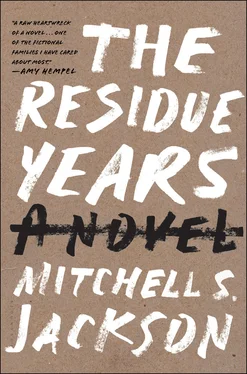In this city, it rains, rains so much you best get to liking the rain, so much I’ve come to love fixing my face to the sound of the rain, love to draw my brows and paint my lips and glue my lashes and, day by day, dot a mole on my cheek — my beauty mark. Most of these females act like just cause we’re here, how we look don’t count, but I got news for them, program or no, inpatient or out, looking good is a full-time occupation. And it ain’t no days off!
No time off if you’re smart from reading people either, which is a skill, a talent white folks have stamped with fancy names: rapid cognition or off stage thought or automatic processing, though I call it what my grandmother — God bless her soul — Mama Liza did, which is your first mind, and like Mama Liza would say, we all got a first mind; it’s just some of us are too fool to follow ours.
I flow past chattering TVs and trilling alarm clocks, past rooms swelled with whispers or troubled breath, flow past posters of quotes, past a boldface placard of the center’s rules, skip right on down to Girlfriend’s room. Girlfriend’s got her door swung wide while she fusses over a closet of what must be hand-me-downs from a shaky stool. Really and truly, she’s always straightening this or that or sweeping or running a rag along dusty sills or hand-mopping her floors or tucking her bunk with corners made for hospitals, or an army base.
By the way, your first mind comes to you in seconds — or less. If you’re listening, it tells you how much you’ll like a person, if you can trust them, it tells you where to rank them; with your first mind you figure how old, how smart, whether they keep a bank balance or specialize in bounced checks.
Girlfriend, who holds her weight — who don’t? — in the wrong places, quakes off the stool. Hurray, she says. Hurray. This time next week. This time next week and you’re on your way.
What she means is I’ve almost reached the end of this stint, which, so help me, is my everlasting last.
She scans a letter from the pile that sits beside a framed five-by-seven of her boys, letters sliced along the edges and crayoned, which, if my mind serves me right, was what got me and her to speaking. Before that you couldn’t get her to open her mouth, couldn’t nobody ply a single word from her till the day we happened upon each other in the hall, she hurrying with her mail and me lugging an armload of books to my room. That day we exchanged hellos and, for reasons neither of us could name, we chatted through both morning groups, through free time, blathered right through lunch. Next thing we knew we were taking all of our meals together, sitting through Sunday services, and swapping stories well past the time everyone else was asleep. Come to find out we were both raised Baptist, lost our mothers as young girls, and have the habit, excuse me, had the habit, of choosing work-allergic roguish men.
Try to split us apart now and you can’t, but who knows beyond my stay what will become of our bond?
Who knows but how could we, how could any one of us, when this life is not that life? When we’ve spent this long dissembling. How could we, though those that know us best or maybe don’t know the risk coax our truest truths into view: that we have problems accepting love, that we don’t know how to let go, that we’re not so good in judging who or what should be kept, that on our worst days, it’s tough to find reasons?
We stroll to the kitchen, my heels clicking and her flats whisking along. If you’ve seen one cafeteria, you’ve pretty much seen them all: a windowless room with soft white walls and gray tile and workers — stone-faced new residents themselves — who at mealtimes serve just enough to keep us alive and no more, which must be why a good few residents look the victim of third world hunger. We are victims of the morning’s longest line, heirs of cooled oats, shriveled links, and shallow juice in cups the size they use for urinalysis.
We find seats and right off she asks me if I heard about the girl who got out last week and relapsed so fast she was back by morning group the next day — sad, sad, yes, but not outside our fates. We come and go. We come and go: the timid ones, the stubborn ones, the worried. Girlfriend sips at what’s left in her cup, which, as I said, wasn’t much to start.
Your boys. You must be about to bust, she says.
Explode. Yes, I say.
Now’s the time for those plans, she says.
That’s the thing, I say. I’ve had them, changed them, and changed the ones I changed.
We watch the latecomers drag in — their eyes full of blood and hair tight-napped at the neck or spun around their head — and catch the last scrapes from the pots and pans. She and I don’t say much else. We are not the last to leave but close, and she walks me to my room. There’s a note under my door that says for me to report to the nurse.
Should’ve known they’d hit you with that last UA, she says. I’ll leave you to it.
What they won’t say here is how we can never know, when we get this close to leaving, if someone would rather see us stay. What they won’t say is what they’ll do to keep you if they choose: botch exit papers, switch UA results, quiz you to tears on a false report from the staff. They keep secret the ploys they use to stretch your days into months, tricks that will send us to places we escaped to serve suspended time, to serve new time, reason why when you reach the end it’s nerves, nerves, nerves.
The UA line stretches far down the hall and I shuffle to the end of it behind a girl from my floor with gobs of white glue caked between the tracks of her weave. You can hear someone curse inside the restroom — what might be a scheme gone bad which wouldn’t surprise me. I once saw a so-called slickster’s balloon of prepackaged urine fall from his armpit, burst, and soak a fussy nurse’s brand new white shoes. Down the line the counselor gapes at us from her office — the wall of champions looming behind her — while the nurse moseys out bearing gifts: twist-cap prelabeled sample cups, and here and there packets of pills.
Which of us experts believes themself a bootleg chemist? Who’s ready to bet against the odds, will hedge against the time it takes to pee clean; against whether they test our urine, or our hair, or our blood.
The counselor slinks out, a wrist noisy from a sleeve of gold bracelets rubbed half-silver. She works her way along the wall frisking us each with just her gaze, waiting for an eye to rove, for a nerve to spark in someone’s balled fist or leg. She reaches me and takes my hand in her hand till my heart slows. Come see me, she says. You be sure to come see me soon.
My turn comes and I hover over the toilet and catch a weak stream in the cup and twist the cap tight. I stand in the dank for a time, braced against the sink, listening to the voices float in through the door. When I come out, I see a new resident, too young for this life, carrying her intake issue — blankets, sheets, a flat pillow — with arms so thin you could rub them for fire. Below bangs hacked to a slant across her face she gives me meek eye-to-eye and slugs up a flight of stairs. She could be me years back my first time in a place like this, though let’s hope she arrives at the truth sooner than I:
It’s no use trying to fool ourselves.
Sometimes fooling ourselves is the only strength that counts.
But time has taught me my options (who knows about the
next man’s?), my options, are full of fast-twitch muscles.
— Champ
Here comes a woman, no coat, with her wet hair matted. Closer, she looks about Mom’s age and, like Mom, makes you wonder if she’s lived a hard-knock life or not. My mother will be out soon, and I can predict the promises she’ll make, a script after years I can recite verbatim, speeches she may believe, but maybe doesn’t. But that matters not. Whatever plans Mom has this time, grand or small, starry-eyed or dull, my plans will be under her plans holding them up.
Читать дальше












